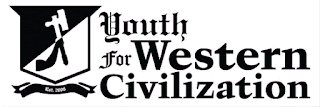In an excellent article since republished in Jacobin, Shuja Haider notes some of the assumptions held in common by the alt-right and by the less cautious (or, put less charitably, bad idpol) arms of the social justice left. Here, I would like to make something of a subordinate point: the ways in which "the West" is constructed and used. As in many cases where the same word is used to refer to many different things, this is a case where sloppy thinking can prevail, as in many such cases, the worst form this sloppy thinking can take is the attempt to construct a falsely coherent object encompassing them all. This is just the role which the concept of "the West," if not properly specified, can play, with consequences from mere silliness at best to undergirding the alt-right's entire ontological project at worst.
Sometimes, when we say "the West," we mean something like "the Christian cultural world." Sometimes, we mean "the advanced capitalist countries." Sometimes, we mean something "West of" whatever we're talking about - such as in claims by various political actors (typically nationalists who might be found, tellingly, anywhere from Germany to India) to be "neither East nor West." Often we mean some vague construct which includes "the Greeks" (but not the Persians,) and then the Roman Empire, and then Latin and possibly Orthodox Christendom but definitely not Islam, and then Western Europe plus settler colonies. It is this suggestion with the best claim to being "the West" tout court, and something that informs our commonsense notions about history. This object is invoked by ordinary center-rightists who use it to link together capitalism, ("Judaeo-")Christianity, the NATO alliance, reason, individualism, the rule of law...
from Colgate University's colorfully named "Center for Freedom and Western Civilization"
...as well as by creepy fascists who are skeptical about all of those things...
from, uh, "Youth for Western Civilization"
Unfortunately, it is only tenable through the metaphysical frameworks of racism or mereological universalism.
The other objects can be usefully referred to, but would be more usefully so referred by other names. I don't especially like the word "civilization," especially as a count noun, because it suffers from many of the same ambiguities, and is even employed for many of the same purposes. But for the rest of this post, let's say that when we refer to "a civilization" we mean a vast (and very fuzzily-bordered) cooperative-coercive network linking together trade in non-luxury goods, production and exchange of ideas among intellectuals, and mutual recognition of (and a common framework for establishing) sovereignty claims. With this we can talk about "bronze age civilization," "the civilization of classical antiquity," "Chinese civilization" (until recently,) "capitalist civilization," and so on.
"Western civilization," however, does not meet this standard - especially if we take it as excluding the things to which "the West" is typically counterposed. Classical antiquity only overlapped with Europe, rather than containing or being contained within it, as can be seen by just looking at the Roman Empire:
And the inheritance of classical antiquity can be seen very easily through two other maps, comparing the conquests of Alexander and Muhammed and his successors, each of which failed to maintain political unity but did establish linguae francae that helped maintain lines of contact that would matter thereafter:
Or just at the obvious ideological continuities: Islam is clearly a successor to Judaism and Christianity, just as Christianity is very self-consciously a successor to Judaism, and Jerusalem is a holy city to it for the same reasons. On the eve of the capitalist revolution, you had a number of important and overlapping trading networks (with cultural and political correlates,) as traced by Abu-Lughod:
And with that capitalist revolution itself, you see the nexus shifting north in Europe, incorporating Africa and the Americas, and eventually the whole world. Today we are all living in capitalist civilization; some just happen to live in its imperial center, just as some happened to live in the center of Roman, or whatever, civilization. And whiteness is just a political and ideological construct reflecting and justifying that center-periphery relationship - no previous peoples would have recognized it, although they would of course have their own justifying myths.
(Now, there is a great degree of overlap between what areas were part of Christendom around 1400 or so, and where the ancestors of people defined as white in 2016 were. But this is just an obvious case of a coincidence, since both what areas are confessionally Christian and which populations are defined as white have been shifting constantly, and the fact that the boundaries of one now correspond to what the other was, at an arbitrary point before the first even existed, should hardly be taken as extraordinary. This is not a complete coincidence, because the racial concept is "genealogically" linked to the confessional one - as it had its genesis in a Spanish imperial context where conversos were under especial scrutiny by the Inquisition and the legal rights of African and American laborers were bound up in debates about their confessional and theological status - but the concepts rapidly diverged.)
These shifting boundaries (and parallel developments elsewhere) necessarily reflect not timeless geographical factors (the kind you'd need for "Western civilization" to be a coherent thing) but timely ones - the way that physical geography interacted with available technology to make lines of commerce and conquest viable, and how political projects moved wealth around through demanding tribute or protecting commerce, which allowed communities of intellectuals to respond to one another.
It is this last factor which does allow us to speak of a coherent-enough West in at least one sense: "the history of Western philosophy." Plato wrote down some things responding to the intellectuals in his environment, which many other Athenian intellectuals found exciting, and responded to; intellectuals in the Roman world responded in the same way to them; and so on down through Dar al-Islam and eventually capitalism. If you're teaching a philosophy course where the historical context - who is responding to points raised by whom, and so on - then this actually all does matter, because there's something cumulative going on. But this "West" necessarily includes North Africa and "the Middle East" as well as "Europe."
Thus when students at SOAS ask for African and Asian philosophers to be preferred to European ones, and for the latter to always be discussed "from a critical viewpoint," under the heading of decolonizing philosophy, they are of course pushing back the colonial viewpoint to where it simply does not apply: St. Augustine and ibn-Khaldun are only African philosophers, and Socrates or St. Thomas only white ones, in the way that Socrates was a "righteous pagan" - that is, these categories mean nothing to the philosophers in question, but do matter (as ideological categories that would later come into being) for the understanding of their reception. On such grounds, of course, the demand by the SOAS students might well be justified - correcting for biases in the way the historiography has been traditionally assembled, including in how the "Western" lineage outlined above may be emphasized above others, and so on - though that a "critical viewpoint" be brought only to the European ones seems frankly bizarre, if reported correctly. (I cannot find their original statement itself, only this additional statement (putting it in the context of some very commonsensical material demands), and all press about it other than the earlier Guardian article appears to have little interest in charity - so I could of course have this wrong, and my apologies to the students if I do.)
Much of the above parallels what has been said on whiteness and white identity in America in particular, generally under the misleadingly edgy slogan of "white people have no culture." American whites have no distinctly common culture other than the merely negative one of not experiencing racism (and even in that case many groups, from Jews to residents of Appalachia, can pass in and out of racialized status.) They get to enjoy American culture in general (together with black Americans), and may have passed down regional cultures from Ye Olde Country as well as developed regional cultures within America itself, and with new communication technologies they like everyone else around the world are increasingly enjoying experimental, hybrid, sub-sub-sub-cultures, and so on - so no white person is at all without culture, for the same reason no human is ever without culture, even a hypothetical white kid from the suburbs whose cultural consumption consists entirely of nu-metal, megachurch sermons, reaction GIFs, and pornography (though one can hope he'll move onto better fare.) The "white" in "white nationalism" refers to a real social relation that they fantasize to be biological, but the "nation" doesn't refer to any group that e.g. Herder would recognize. (The smarter ones are actually very much aware of this and are very interested in the roles of myth and ritual in creating the felt sense of being a people; and in fact my guess is that many of them esoterically subscribe to social construction on race, but see the myth of biological race as an idea that can be purposed towards creating a healthy collectivist but non-universalist re-enchanted antimodern culture.)
In sum, there is nothing especially bad about most of the things that go under the heading of "the West" or "Western Civilization" - and I in fact very much hope that Aristotle, Shakespeare, Mozart, etc. continue to be appreciated for millennia to come (though I also see the danger in this century very much not being loony left humanists seeking to decolonize, but university administrators seeking to economize) - but hallucinating a "Western civilization" that groups them all together, is neither accurate nor useful.







No comments:
Post a Comment